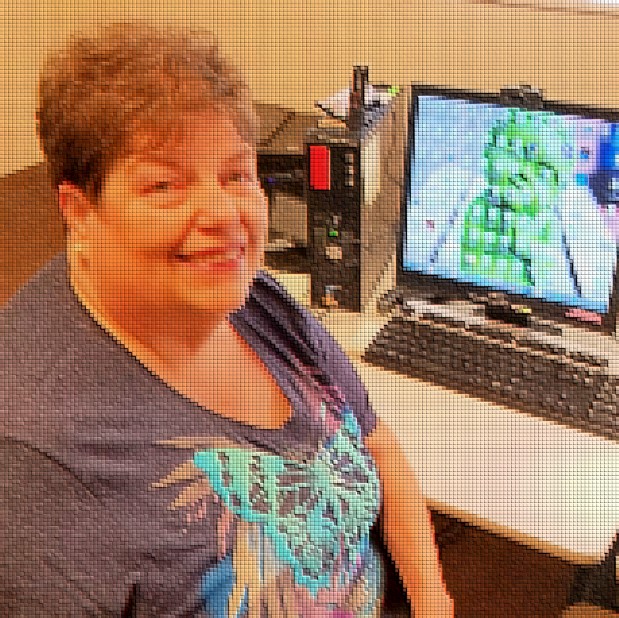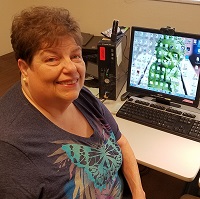I am very reluctant to “come out” as a person with dementia. The stigma is great. Once people label us as people with dementia, we suddenly move from being productive members of society into being described with deprecating labels including: mistaken, forgetful, irrelevant, delusional, and irrational.
And yet, dementia develops unnoticed for years. Fifteen years passed from the time I functioned normally to the time the neurologist told me I have dementia. Some dementias develop very slowly like this.
 A Pixelated Analogy of Dementia
A Pixelated Analogy of Dementia
Digital photographic images are described in pixel sizes. An image, 1920 pixels by 1281 pixels has 2,459,520 pixel-sized dots. Some pixels (dots) may be tan and gray; others, teal, green, and blue. Even if the image is familiar, your loved one’s face, for example; if you were shown only a dozen randomly placed pixels out of two-and-a-half million, you would not be able to identify “the big picture.”
The human brain contains an estimated 100 billion neurons and approximately one quadrillion synaptic connections. That’s a 1 followed by 15 zeroes!
A synapse is like one pixel in a picture. In Alzheimer’s, amyloid plaques clog the synapses between two neurons, blocking the flow of electro-chemical messages. Initially, the number of disruptions are miniscule.
As dementia progresses, the number of missing pixels explodes. In the brain’s language function, for example, disruption starts with being unable to recall a word now and then. It progresses to being able to form only simple sentences. Finally, a person is unable to express meaning at all. Motor skills deteriorate in the same way. Minor balance issues lead to the need for a walker to being unable to stand or sit. The person becomes bedridden. Thinking functions are likewise affected.
My Experiences Leading Up to Dementia
Initially, I was unable to connect the missing dots as there were only a few missing pixels across a long span of time.
- A former ice skater, my balance became so poor, I could not steady myself on one foot long enough to step over an 18-inch rivulet on a hill. Dot.
- Suddenly, I was blind in only one eye. A minute later, my sight was back. Dot.
- I failed to show up to give a presentation at a state conference for educators. Yikes! I had never been told about it. Had I? Dot.
- I sat on the floor inside the screen door. My Cocker Spaniel was waiting outside to be let in. I don’t remember how I got on the floor. Dot.
- I couldn’t remember the name of a doctor I had seen for years. Dot.
- The model of my new car escaped me at the license bureau. All I could say was Mazda. Dot.
- Although I taught speed reading, I had to request an extension in a graduate school class to finish reading the text. Dot.
Each dot was an isolated and unrelated event. Each, peculiar enough, to be remembered; but there were too few of those dots to be identifiable as a picture.
No Denial… Initially
I wasn’t denying the existence of dementia. Denial implies suppressing something objectionable in the subconscious. I didn’t even recognize dementia at the time.
Then I was diagnosed – an exceedingly tough time. Triggering Dr. Elisabeth Kübler-Ross’s five stages of grief: denial and isolation; anger; bargaining; depression; acceptance. While Dr. Kübler-Ross’s work refers to dying, it can also help one cope with a diagnosis of a terminal disease like dementia. After my diagnosis, denial reared its head for self-preservation. My goal now, is to live as comfortably as possible with dementia.
Carole Mulliken is a retired educator, message board moderator for the Dementia Advocacy and Support Network International (DASNI), and an active member of the Dementia Alliance International (DAI). She has written for both online and print publications. She recently “came out” of hiding as a person with dementia.










I’m so glad I read this article. I think i’m going bonkers. I have experienced several of the same events, and more. Scary stuff. Thank you for your insight.
Great article Carole. Thank you for the encouraging words.
Wonderful article, Carol! <3
Sheila & Bert Merrell
Hello Sheila and Bert Every time I pass Magnolia Drive I wish you were still there. It seems certain things are supposed to be permanent – like the McClure’s holly tree.
Thanks for responding!
Takes so much courage! I am looking forward to the day when more of us all treat people who have been affected by this mean disease with understanding. And even more of course to the day when it can be stopped. Thanks for this, Carole, and thanks Brenda for shedding continual light on the issue.
Ina, yes, one day, we will find greater acceptance of people with dementia just as we accept people with cancer and other diseases and illnesses.
Thank you for your encouraging words.
Great article. I wrote an article “The Stigma is Real.” I am a primary caregiver for my husband and author, speaker as well our book, The 24 Hour Rule:Living with Alzheimer’s has been very helpful to many. Michael was diagnosed at 55 snd now 61 and still status quo. Wishing you well.
Thank you Cheryl for sharing your experience as a caregiver for your husband – in a book, no less – and for writing an article on stigma.
Cheryl, Here’s wishing you and Michael well also. We’re all in this together!